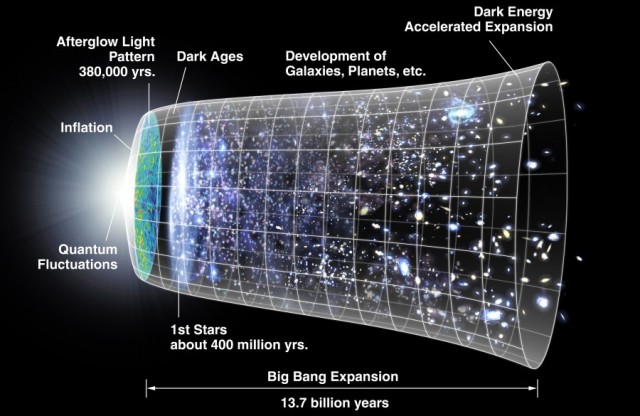Earlier this week author and scientist Dr. Stacy Trasancos wrote an excellent article on how studying the unique properties that exist in our universe from the Big Bang to today can give insights into the mind of God. I encourage you to read the entire article here but set forth below is an extended excerpt:
“In the first roughly one trillionth of a trillionth of a trillionth of a second after the universe’s birth, scientists are discovering a fine line between chaos and stability. Physicist and atheist Sean Carroll remarked that the mass of the latest discovered particle, the Higgs boson, turns out to be “right on the edge” in terms of the universe’s stability. Tia Ghose of Live Science described it, “A little bit lighter, and the Higgs field would be much more easily perturbed; a little heavier, and the current Higgs field would be incredibly stable.”
While it is inappropriate to extract theological meaning from incomplete scientific theories, it is insightful to note consistencies with Christian thought.
Obviously, the idea that the universe had a beginning is consistent with the first words of Genesis, and so is the idea of order and symmetry. St. John referred to Christ as the “Father’s only-begotten Son full of grace and truth,” using the Greek word monogenes to express “only begotten.” In ancient Greece monogenes referred to the eternally emanating cosmos. In Latin it translates as unigenitus, or universum. To Plato, the monogenes was the Unknown God, the universe itself. When John called Christ by the same words, it marked a radically different view of God and of the cosmos. The Unknown God was named the Christian God, a Trinitarian and Incarnational God. Christ, the Second Person of the Holy Trinity, the Son,became man. Christ, as God, created the universe. Christ, the Word, the Logos, is Rationality Itself.
Catholic physicist Peter Hodgson once wrote something similar to Carroll’s comment about the fine line between stability and chaos, but it was in reference to God and the overall order of the universe. “There is here a delicate balance between the rationality and the freedom of God.” To believe God set the world in motion and left it to run, leads to determinism. A God of unpredictable volition, gives us chaos. Both beliefs are inimical to the growth of science, and Christianity accepts neither.
In the context of Christianity, physical symmetry and fine-tuning give insight into the language of God who freely chose to create an ordered universe, but who interacts in human history and holds everything in existence by His will. That scientists, both atheist and Christian, search for such insight is evidence they trust such stability and symmetry exists. Is it any wonder that science was born in a Christian culture?”


I have a friend who works on the accelerator at CERN. I need to send him all these posts of yours to see how he reacts to them. Thank you for keeping us awake 🙂
Claire:
Too funny. CERN seems like an amazing place. I hope to visit it someday. Hope all is well.
Peace,
W. Ockham
Science helps us to see how grand — and beyond — the idea of God really is! “No word has touched It, no tongue has soiled It.”